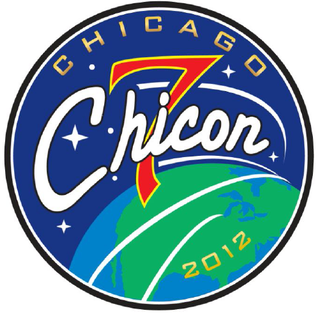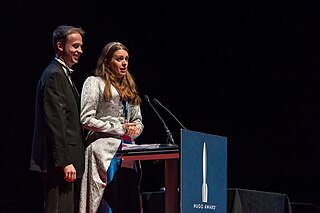The Hugo Award for Best Novel is one of the Hugo Awards given each year for science fiction or fantasy stories published in, or translated to, English during the previous calendar year. The novel award is available for works of fiction of 40,000 words or more; awards are also given out in the short story, novelette, and novella categories. The Hugo Awards have been described as "a fine showcase for speculative fiction", and "the best known literary award for science fiction writing".
The Hugo Award for Best Dramatic Presentation is given each year for theatrical films, television episodes, or other dramatized works related to science fiction or fantasy released in the previous calendar year. Originally the award covered both works of film and of television but since 2003, it has been split into two categories: Best Dramatic Presentation (Long Form) and Best Dramatic Presentation (Short Form). The Dramatic Presentation Awards are part of the broader Hugo Awards, which are given every year by the World Science Fiction Society for the best science fiction or fantasy works and achievements of the previous year. The awards are named after Hugo Gernsback, the founder of the first science fiction magazine, Amazing Stories, and was once officially known as the Science Fiction Achievement Award. The award has been described as "a fine showcase for speculative fiction".
The Hugo Award for Best Novella is one of the Hugo Awards given each year for science fiction or fantasy stories published or translated into English during the previous calendar year. The novella award is available for works of fiction of between 17,500 and 40,000 words; awards are also given out in the short story, novelette and novel categories. The Hugo Awards have been described as "a fine showcase for speculative fiction" and "the best known literary award for science fiction writing".

The Hugo Award for Best Novelette is one of the Hugo Awards given each year for science fiction or fantasy stories published or translated into English during the previous calendar year. The novelette award is available for works of fiction of between 7,500 and 17,500 words; awards are also given out in the short story, novella and novel categories. The Hugo Awards have been described as "a fine showcase for speculative fiction" and "the best known literary award for science fiction writing".
The Hugo Award for Best Short Story is one of the Hugo Awards given each year for science fiction or fantasy stories published or translated into English during the previous calendar year. The short story award is available for works of fiction of fewer than 7,500 words; awards are also given out for pieces of longer lengths in the novelette, novella, and novel categories. The Hugo Awards have been described as "a fine showcase for speculative fiction" and "the best known literary award for science fiction writing".

The Hugo Award for Best Fanzine is given each year for non professionally edited magazines, or "fanzines", related to science fiction or fantasy which has published four or more issues with at least one issue appearing in the previous calendar year. Awards were also once given out for professional magazines in the professional magazine category, and since 1984 have been awarded for semi-professional magazines in the semiprozine category; several magazines that were nominated for or won the fanzine category have gone on to be nominated for or win the semiprozine category since it was established. The Hugo Awards have been described as "a fine showcase for speculative fiction" and "the best known literary award for science fiction writing".
The Hugo Award for Best Professional Artist is given each year for artists of works related to science fiction or fantasy released in the previous calendar year. The award has been given annually under several names since 1955, with the exception of 1957. The Hugo Awards have been described as "a fine showcase for speculative fiction" and "the best known literary award for science fiction writing".
The Hugo Award for Best Fan Writer is the Hugo Award given each year for writers of works related to science fiction or fantasy which appeared in low- or non-paying publications such as semiprozines or fanzines or in generally available electronic media during the previous calendar year. There is no restriction that the writer is not also a professional author, and several such authors have won the award for their non-paying works. The award was first presented in 1967 and has been awarded annually.

The Hugo Award for Best Professional Editor is one of the Hugo Awards given each year for science fiction or fantasy stories published or translated into English during the previous calendar year. The award is available for editors of magazines, novels, anthologies, or other works related to science fiction or fantasy. The award supplanted a previous award for professional magazine. The Hugo Awards have been described as "a fine showcase for speculative fiction" and "the best known literary award for science fiction writing".

The Hugo Award for Best Semiprozine is given each year to a periodical publication related to science fiction or fantasy that meets several criteria having to do with the number of issues published and who, if anyone, receives payment. The award was first presented in 1984, and has been given annually since, though the qualifying criteria have changed. Awards were once also given out for professional magazines in the professional magazine category, and are still awarded for fan magazines in the fanzine category.
The 66th World Science Fiction Convention (Worldcon), also known as Denvention 3, was held on 6–10 August 2008 at the Colorado Convention Center and the Sheraton Denver Downtown Hotel in Denver, Colorado, United States.

The 70th World Science Fiction Convention (Worldcon), also known as Chicon 7, was held on 30 August–3 September 2012 at the Hyatt Regency Chicago in Chicago, Illinois, United States.
The Hugo Awards are presented every year by the World Science Fiction Society for the best science fiction or fantasy works and achievements of the previous year. The award is named after Hugo Gernsback, the founder of the pioneering science fiction magazine Amazing Stories, and was once officially known as the Science Fiction Achievement Award. The award has been described as "a fine showcase for speculative fiction" and "the best known literary award for science fiction writing". In addition to the regular awards that have been given in most years that the awards have been active, several discontinued Hugo Awards have been presented throughout the years, only to be removed after a few years.
The Hugo Award for Best Related Work is one of the Hugo Awards given each year for primarily non-fiction works related to science fiction or fantasy, published or translated into English during the previous calendar year. The Hugo Awards have been described as "a fine showcase for speculative fiction" and "the best known literary award for science fiction writing".

The Hugo Award is an annual literary award for the best science fiction or fantasy works and achievements of the previous year, given at the World Science Fiction Convention (Worldcon) and chosen by its members. The award is administered by the World Science Fiction Society. The Hugo is widely considered the premier award in the science fiction genre, and winners are often noted on book covers. It is named after Hugo Gernsback, the founder of the pioneering science fiction magazine Amazing Stories. Hugos were first given in 1953, at the 11th World Science Fiction Convention, and have been awarded every year since 1955.

The Hugo Award for Best Graphic Story is given each year for science fiction or fantasy stories told in graphic form and published or translated into English during the previous calendar year. It has been awarded annually since 2009. The Hugo Awards have been described as "a fine showcase for speculative fiction" and "the best known literary award for science fiction writing".

The Hugo Award for Best Fancast is one of the Hugo Awards, and is awarded to the best non-professional audio or video periodical devoted to science fiction, fantasy, or related subjects. The Hugo Awards have been described as "a fine showcase for speculative fiction" and "the best known literary award for science fiction writing".
The Hugo Award for Best Series is one of the Hugo Awards given each year for science fiction or fantasy stories published or translated into English during the previous calendar year. The award is available for series of science fiction or fantasy stories consisting of at least 3 published works totaling at least 240,000 words, with at least one work released or translated into English during the previous calendar year. A losing finalist becomes eligible again with the publication of at least two new works totaling at least 240,000 words.
The Lodestar Award for Best Young Adult Book is an award given annually to a book published for young adult readers in the field of science fiction or fantasy. The name of the award was chosen because a lodestar is "a star that guides or leads, especially in navigation, where it is the sole reliable source of light—the star that leads those in uncharted waters to safety". The nomination and selection process is administered by the World Science Fiction Society (WSFS), and the award is presented at the Hugo Award ceremony at the annual World Science Fiction Convention, or Worldcon, although it is not itself a Hugo Award.
The Hugo Award for Best Game or Interactive Work is one of the Hugo Awards given each year for science fiction or fantasy works released in the previous calendar year. The game award is given out to video games, tabletop games, and other interactive works; non-interactive audiovisual works receive awards in the dramatic presentation category. The Hugo Awards have been described as "a fine showcase for speculative fiction", and "the best known literary award for science fiction writing".







